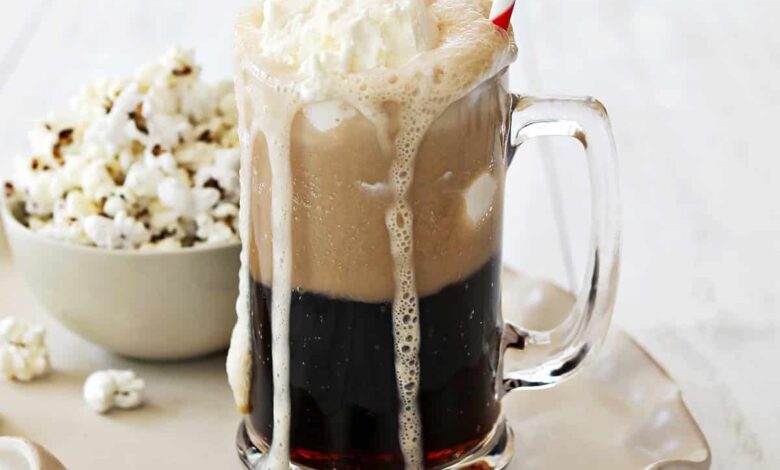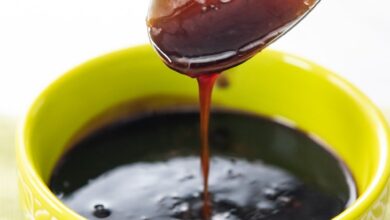Root Beer Float – A Beautiful Mess

A classic Root Beer Float is a refreshing summertime dessert. This recipe comes from the soda shop era. This classic treat is perfect for a hot day with kids. Made with scoops of vanilla ice cream and root beer, this frosty treat can be made in just minutes!
More Drinks: Roy Rogers, Shirley Temple, Arnold Palmer, Bubble Tea.

Ingredients in a Root Beer Float
- Vanilla Ice Cream – Choose old fashioned vanilla or vanilla bean ice cream.
- Root Beer – Choose your favorite root beer—we used IBC.
What is the best float glass? I like to serve this drink in a beer stein or a milkshake glass.

Instructions
Traditionally, a root beer float is made by scooping ice cream into a tall glass and then pouring root beer over the top. This method prevents overflowing as the ice cream begins to foam.
Personally, I like to pour the root beer first and top it with a scoop of ice cream. This method, while it has more risk of overflowing, has more contrast between the dark soda and ice cream—it’s a little prettier.
Either way, both methods are equally delicious and the prep time should be less than a minute! Have fun making a perfect root beer float.

Tips for Making
- To make an adult root beer float, add a shot of dark rum, vanilla vodka or bourbon to the top of the float. Adding a shot (one ounce) of any liquor you love most will turn it into an alcoholic root beer float.
- Some recipes call for whipped cream with sprinkles and a maraschino cherry on top.
- I like to serve my floats with a straw and a spoon. Much like a milkshake, it’s fun to have both options.
- Try chocolate ice cream instead of vanilla for a slight variation. Even better, make one of each and compare, choosing a favorite.
- If you want to go even more old school, use sparkling water and flavored syrups to create your sodas from scratch.
Variations
- Coke Float – A Coke Float is made using vanilla ice cream and Coca-Cola.
- Cream Soda Float – A Cream Soda Float is made using vanilla ice cream and cream soda.
- Strawberry Float – A Strawberry Float is made using vanilla ice cream and strawberry soda.
- Orange Creamsicle Float – An Orange Creamsicle Float is made using vanilla ice cream and orange soda.
- Boston Cooler – A Boston Cooler is made using vanilla ice cream and ginger ale.

Frequently Asked Questions
What goes first in a Root Beer Float?
Traditionally, the ice cream goes first in a root beer float. This helps to prevent overflowing as it foams up.
What is a Root Beer Float made of?
A Root Beer Float is made of vanilla ice cream and root beer.
What ice cream flavor is best for a root beer float?
Vanilla ice cream is the classic choice for a root beer float.

More Recipes to Try
Get our FREE recipe guide with our most popular recipes of all time!

Free Popular Recipe Guide
Our top 25 recipes of all time!
Get the Recipe
Learn to make a classic root beer float using creamy vanilla ice cream and root beer soda. It’s a classic for a reason!
Instructions
-
Add two scoops of vanilla ice cream to a tall glass.
-
Slowly pour root beer over the top until full.
-
This method prevents overflowing as the ice cream begins to foam.
Notes
- To make an adult root beer float, add a shot of dark rum, vanilla vodka or bourbon to the top of the float. Adding a shot (one ounce) of any liquor you love most will turn it into an alcoholic root beer float.
- Some recipes call for whipped cream with sprinkles and a maraschino cherry on top.
- I like to serve my floats with a straw and a spoon. Much like a milkshake, it’s fun to have both options.
- Try chocolate ice cream instead of vanilla for a slight variation. Even better, make one of each and compare, choosing a favorite.
- If you want to go even more old school, use sparkling water and flavored syrups to create your sodas from scratch.
Nutrition
Nutrition Facts
Root Beer Float (ready to proof)
Amount per Serving
% Daily Value*
* Percent Daily Values are based on a 2000 calorie diet.
Notice: Nutrition is auto-calculated, using Spoonacular, for your convenience. Where relevant, we recommend using your own nutrition calculations.
Source link




